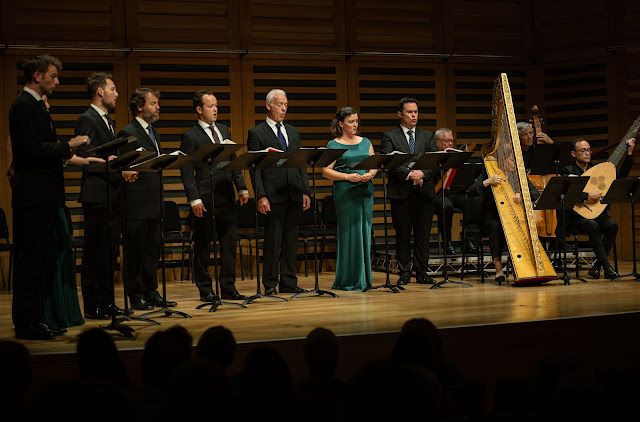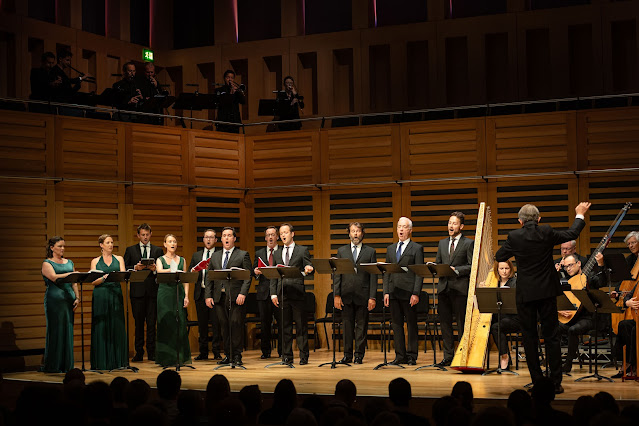 |
| Monteverdi: Vespers of 1610 - I Fagiolini, English Cornett & Sackbut Ensemble, Robert Hollingworth - Kings Place (Photo: Monika S Jakubowska) |
Monteverdi: Vespers of 1610; I Fagiolini, English Cornett & Sackbut Ensemble, Robert Hollingworth; Kings Place
Reviewed by Florence Anna Maunders, 29 September 2023
Clarity and virtuosity in spectacular polychoral combination
 |
Monteverdi: Vespers of 1610 - I Fagiolini, Robert Hollingworth |
This was an evening filled with inspired solo contributions, in which practically every musician on (and around, and behind) the stage had their moments in the spotlight, whether in the sacred songs and duets, or within the more complex scoring of the psalm settings and the glorious closing Magnificat. Particularly striking was the supple, yearning voice of tenor Nicholas Mulroy, who delivered the aria Nigra Sum with limpid beauty and theatrical vocalisation, and a gift for lifting from a quasi-parlando into soaring lyricism. Equally ravishing and sensual was the pairing of Julia Doyle and Clara Hendrick, whose vocal interplay was inspired, seeming almost to melt together at points, before spiralling off in sequential cascades delivered with casual perfection of intonation and ensemble. Another glorious duet moment came from tenor Matthew Long and Nicholas Mulroy, whose angelic tones were set against the most delicate of continuo accomplishment. Monteverdi intended this music for the private chapels of princes, and the intimacy this implied was present in every note of the simply beautifully delivered Duo Seraphim.
Owing to Hollingworth's one-to-a-part approach, the five colossal psalm settings never felt like choral singing, but instead like the biggest, most glorious and radiant chamber music. It was clear that Hollingwood trusts his singers to find their own expression and interpretations, and to inhabit the lines of the music in their own way. The result, with each singer and instrumentalist taking full responsibility for their own performance, was truly remarkable, totally fresh, and possibly very close to Monteverdi's original conception for the Vespers.
Alongside the vocalists, there was a significant contribution to the splendour of the evening from the opulent and extravagant instrumental ensembles. Alongside some outstanding and attentive accompaniment duties, Harpist Aileen Henry contributed an inspired, elegant and mesmerising solo interpolation which was very much in keeping with the practice of the period, while baroque violin specialist Kinga Ujszászi led a robust, flexible (and highly mobile) string band, working at times almost as a second conductor, and delivering an absolutely incredibly virtuosic duet with her colleague Naomi Burrell in the Sonata. Nor can I resist a mention for the characterful and colourful bass lines and obbligati from the woodwinds (dulcian and recorders) of period instrument stalwart William Lyons.
 |
| Monteverdi: Vespers of 1610 - I Fagiolini, English Cornett & Sackbut Ensemble, Robert Hollingworth - Kings Place (Photo: Monika S Jakubowska) |
The reaction at the end from the sold-out capacity audience was tumultuous – a sustained standing ovation for surely one of the most impressive performances of these pieces so far this century. Like Napoleon's "army of generals" this consort of soloists, this orchestra of individuals, I Fagiolini (and friends) conquered all before them at Kings Place.
Reviewed by Florence Anna Maunders
Never miss out on future posts by following us
The blog is free, but I'd be delighted if you were to show your appreciation by buying me a coffee.
Elsewhere on this blog
- Modernising Monteverdi: The Coronation of Poppea from English Touring Opera in a radical new version by Yshani Perinpanayagam - opera review
- The 1930s sextet: contrasting works from Dohnanyi and Poulenc at the heart of Kaleidoscope Chamber Collective and Orsino Winds collaborative concert - concert review
- The sheer delight of playing together: Ben Goldscheider & friends in Brahms, Schumann & Joseph Phibbs premiere at Hatfield House - concert review
- What is essential is that you have to be passionate about the work: Canadian baritone Étienne Dupuis, Don Carlo in the Royal Opera's revival of La Forza del Destino on his clutch of Verdi roles - interview
- Three more gems: British Piano Concertos from Simon Callaghan & BBC National Orchestra of Wales - record review
- Dramatick Opera: Christian Curnyn and the Early Opera Company in Purcell and Dryden's King Arthur at Temple - opera review
- Drinking the stars: Mary Dullea plays the piano music of John McLachlan - record review
- A Lady and her Reputation: with modern recordings of Ethel Smyth's major works in the catalogue, we now need to put her work into a proper context - feature
- A half hour full of switchback changes, genuine surprise & delight: Rania Chrysostomou & Sarah Parkin's On Being Vocal at Tête à Tête - opera review
- The juxtaposition of extreme eras of music makes people think about what is fascinating in the music: Ukrainian pianist Vadym Kholodenko on his London Piano Festival programme - interview
- Drawing us into Handel's magical world: Amadigi di Gaula from the English Concert & Kristian Bezuidenhout with Tim Mead, Mary Bevan, Hilary Cronin, Hugh Cutting - opera review
- Home



.jpg)







No comments:
Post a Comment